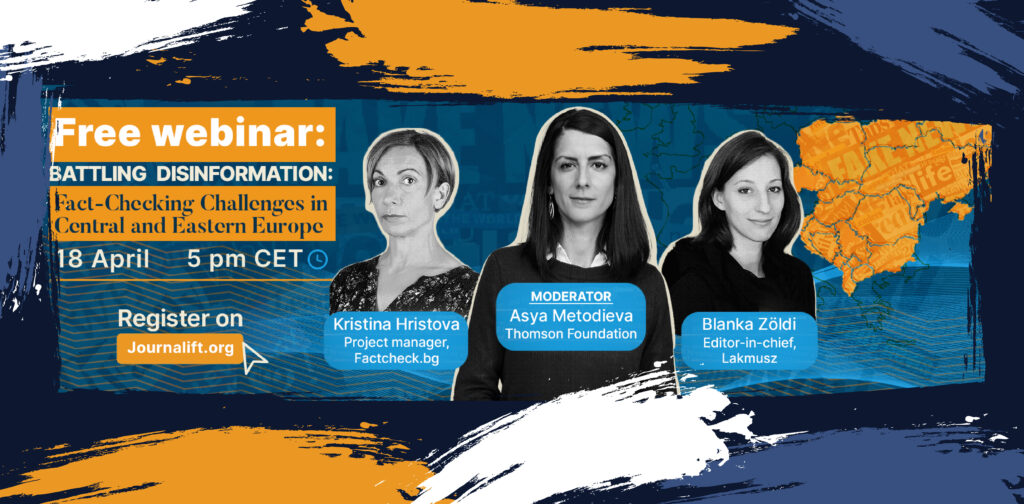In a challenging media business environment and labour market, many organisations, both smaller and larger, are looking to launch internship programmes as a way to acquire new and motivated staff members who bring fresh skills and perspectives to their outlets. In addition, smaller media outlets often struggle with the lack of human and financial resources, and an attractive internship programme might help with this issue. On the other hand, internships can provide a meaningful experience for young individuals that might enhance their future employability. This is especially important at a time when the COVID-19 pandemic has enhanced graduate unemployment worldwide.
This article makes an attempt to introduce best practice recommendations on how to get the most out of an internship stream, how to contribute to the intern’s professional development, as well as share some lessons learnt based on a Female journalists’ internship stream run by the Thomson Foundation between June and November 2023 in five Central European countries.
Internships aren’t just about work anymore
When creating an internship programme, it is important to be thoughtful about the goals and what the specific media outlet has to offer to interns.
In many cases, as mentioned above, internship programmes are a way to get some extra help. However, that is not always the best way to involve an intern into the work or evaluate if they can develop the skills needed to succeed in their career. With the right programme, young talents can learn and develop. Therefore, the first step is establishing the right kind of programme and paying the interns to ensure that they can contribute to the specific media outlet. By developing the right programme and working with experienced colleagues and other interns, an inexperienced journalist could one day become the editor-in-chief of the outlet where she started.
Establish an intern programme coordinator
Having a person in charge of the interns is crucial for building a programme that pushes candidates and ensures they get the most out of their experience. The best part is, for small media outlets, this position does not need to be a separate full-time position.
Internship coordinators can build a programme that ensures the interns have a collective learning experience. In the Female journalists’ internship stream run by Thomson Foundation I was the one who coordinated the programme and ran the internship. I trained the interns on various topics, provided them e-learning courses and individual consultations as well as group work, in order to help them develop valuable skills and produce articles at the end of different milestones.
Assign each intern a mentor
Providing a mentor means giving interns an opportunity for personalised feedback on their work and matters that extend beyond their tasks. Mentorship is a way to hone professional skills and learn invaluable lessons from someone with years or decades of practical knowledge in the field of journalism.
Mentors can promote professional growth and development and part of their role is to create a relaxed environment and relationship with the interns, as they might have questions that they would not feel comfortable asking their editors.
Or simply, they may need extra help that is not so easy to receive in a smaller outlet due to lack of time and human resources.
In the Female journalists’ internship stream there were multiple mentors for the interns. One mentor worked with everyone from the outlet – usually only 1-2 people were staff members – and I was the one, the coordinator of the internship programme who provided extra mentorship for the interns. Unfortunately, we had to work under time pressure – as journalists usually do – and the summer months were not ideal for having enough relaxed sessions with the interns. One lesson learned here is that the middle of the summer is surely not the ideal time to launch an internship programme!
Setting goals and workloads

Setting goals for interns and revisiting their progress throughout their tenure is another important step in development. In general, interns often work on two or three articles or projects, depending on the length of their internship.
The key to success here is tracking their progress and ensuring there is a defined beginning, middle, and end to their work.
It is really nice for an intern to feel like they joined, started to work on something, and they completed that work, as opposed to feeling like they have been working on something and never get to see it through to the end.
In our case gender disinformation was the wide topic they needed to cover, but they had the freedom to choose their topics based on their interests and the profile of their outlet. In the summer almost all interns working on the project completed two articles, interviews or longforms. In the autumn, they started working in cross-border teams to cover the gender-pay gap in their respective countries from a comparative perspective. But in the meantime, most interns worked for their outlet, covering daily news as well. Their time and capacities were definitely put to good use!
Make intern development a regular commitment
It is important to ensure that the internship programme has a structured set up, so interns consistently receive feedback and stay on track with both their personal goals and the internship’s goals. This is a crucial step not only in providing a personalised experience, but for those leading the programme. Regular feedback allows the outlet to guide interns effectively, ensuring they produce the desired quality of work. Deadlines, integral in journalism, can be considered milestones for the projects.
In our programme we met online each week or at least biweekly, reviewing each intern’s work and developing detailed to-do lists for the upcoming weeks to complete their articles. These meetings were useful, offering a basic framework to prevent interns from feeling adrift in an abstract environment or experiencing loneliness.
Once again, the importance of milestones and internal deadlines cannot be emphasised enough.
Another key element of the success is maintaining constant communication with interns. Otherwise, they may drift from their responsibilities and lose sight of their tasks and role.
Stay in touch
Once the internship programme comes to an end, it is worthwhile to maintain connection with the former interns – even if you can’t hire them immediately after closing the programme. Staying in touch with interns acts as proactive networking and keeping in contact means that the outlet might be able to provide the opportunity to reconnect in the future. It is especially important in Central Europe where outlets are under financial and political pressure and where gender disinformation (usually generated by the governments) can be quite strong.
As mentioned earlier, a good internship programme serves as a training ground for young talent and can often result in full-time or part-time employment if financial means are available. This was the case in our internship, where some interns were already integrated into the outlets in various forms. The internship programme not only helped to train and develop these young individuals but also kept them "inside the house."
Paid or unpaid interns

We have reached the last crucial point. A very important aspect that should never be overlooked is that interns should be paid. Paying interns will allow access to talented candidates who otherwise may have not applied. On the other hand, paying interns makes them feel appreciated and part of the team, and it might motivate them to work harder. Getting paid is especially important in the countries where Thomson Foundation ran the gender disinformation programme, where even senior journalists are usually underpaid. If organisations do not pay interns, it probably means that the programme can attract only young people whose parents can financially support their kids. If interns are doing real work, they must be paid!
This was the case in the gender disinformation internship programme where ten paid young female journalists covered various topics. They interviewed female judges and prosecutors as well as local actresses sharing their experience and challenges. They also explored women whose professional choices are less „typical” for women, female roles in the mass media and female entrepreneurs, online harassment against female journalist, how single parents are copying with their tasks and whether they receive any help from the society, how local organisations try to help victims of domestic violence and many more.
Planning is key
The range of internships can vary, ours took 4 months. Part of the planning was setting up the milestones – deadlines for publications – and running regular calls about the progress of the interns. They worked under the supervision of their editor-in-chief and with their mentors, as mentioned above, in pairs or in small groups when it came to the cross-border coverage of the gender pay gap. Strong communication and collective experience are important: we close the programme in a regional personal meeting in Veszprém (Hungary) at the end of October when interns could finally meet in person with each other and with their mentors. It was also important as the interns could feel like their work contributed to their outlets and to the overall goal of having these articles published for local audiences who otherwise would not have heard of these topics.
One topic covered by one of our interns, Kata Tihanyi (Veszprém Kukac, Hungary) was an interview with the female reintegration officer of the Veszprém prison. Kata also wrote a methodological piece after the article was published about her experience in the prison and how she prepared herself with the help of her editor in chief and mentors for the interview. Follow Journalift next week for the full interview.































